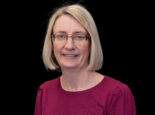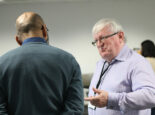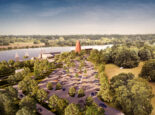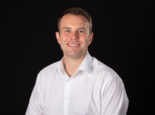A Tale of Two Cities
[prev] …educational element within the city is critical. We spend a lot of time working with young entrepreneurs coming out of both universities, and more and more are looking to set up new social ventures or are looking at environmental applications of new technologies.’
The lack of such a university in Peterborough is a factor that has often been cited. Ivan Cutting, artistic director of theatre company Eastern Angles, has been involved in numerous community theatre projects in Peterborough, several of which have explored the history of the city’s growth – in particular, the impact of the sweeping changes brought about in the late 60s and early 70s by the Peterborough Development Corporation.
‘There were a number of visions,’ he says. ‘One of them was to make it a green city, which was a fantasic vision, and I think they achieved that. The next was to create homes for literally thousands of people, and I think they partially achieved that. One of the great things they did was that they didn’t go down the high-rise route. But they missed a few tricks. Talk to anyone from the Development Corporation and they say: “We didn’t get a university, and we should’ve got one…” That would have helped ignite the potential for the city, and helped bring in different kinds of people – as well as preventing its talent from moving away.’
On this, Charles Taylor comments: ‘That can all change if plans for development of the university in Peterborough go ahead. It’s a case of what you put your finger on in Peterborough as an area of expertise – I don’t know the answer to that, and I don’t know if anyone does.’ That change for Peterborough, however, is coming from Cambridge – with the involvement of Anglia Ruskin, which already offers certain courses in Peterborough.
“For the continued growth and success of Peterborough we need to have a fully fledged university with a campus, and students who are part of the community”
John Bridge – who has worked closely with Anglia Ruskin – adds: ‘Certainly I believe that for the continued growth and success of Peterborough we need to have a fully fledged university with a campus, and students who are part of the community. If you look at the night-time economy, which is so strong in Cambridge, you need those ingredients.’
As Douglas Gyte has indicated, all these factors are linked – and Peterborough’s Council Leader Marco Cereste has already declared that developing the night-time economy is part of his vision. ‘It’ll bring that vibrancy that we need,’ he says. ‘It’ll change the city, and make businesses more sustainable.’
LOCAL AUTHORITIES
‘Vision’ is an overused term when it comes to future development, and one that has been heard a great deal in Peterborough in recent years. But oddly, given its status as a hotbed of new ideas, it’s not often heard around Cambridge – at least, not in relation to the development of the city itself.
‘There’s the whole issue of not having a unitary authority,’ says Caroline Hyde. ‘All the time I spent at Anglia Ruskin, that was my feeling – that this was one of the difficulties. Although you have Cambridgeshire County Council working on a countywide basis, the fact that you have to deal with the City Council and then the District Councils does prevent there being a solid vision for moving the county as a whole forward. Having something like Opportunity Peterborough gives you the vehicle to guide that forward. I think anybody working within Cambridgeshire is always aware of where there are gaps, and where there’s an opportunity to make a real impact where things aren’t being addressed. There have been moves to try and address the kind of issues that Opportunity Peterborough look at, because that kind of unified vision is something that would really enable more businesses and more infrastructure.’
It’s all about leadership, because it’s people that make things happen. It’s people that make the difference
According to John Bridge, however, those moves are always going to be limited in what they can achieve. ‘There are something like 63 different business organisations in Cambridge… Obviously people in the business community have recognised that things aren’t right and that there’s a focus lacking, so their solution has been to create yet another organisation. Ultimately, that is not the way to deal with that problem, because it is just adding another dimension to something that is fundamentally flawed. Actually, it’s all about leadership, because it’s people that make things happen. It’s people that make the difference. In Peterborough, you’ve got a leader, who can actually ensure that there is strong leadership. In Cambridge, I do not know who that leader is. All the business organisations and businesspeople I know understand that the current system is not fit-for-purpose for an international city.’
So what is the answer to this? ‘I think the business community needs to find a way to unite, to spell out the reasons and the benefits. Cambridge benefits from having the best… [cont]
















